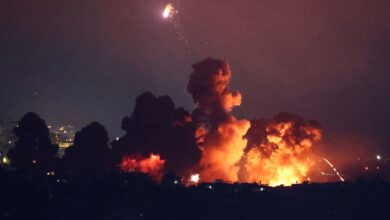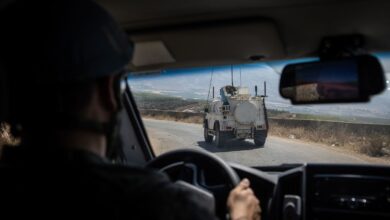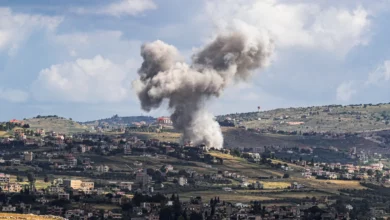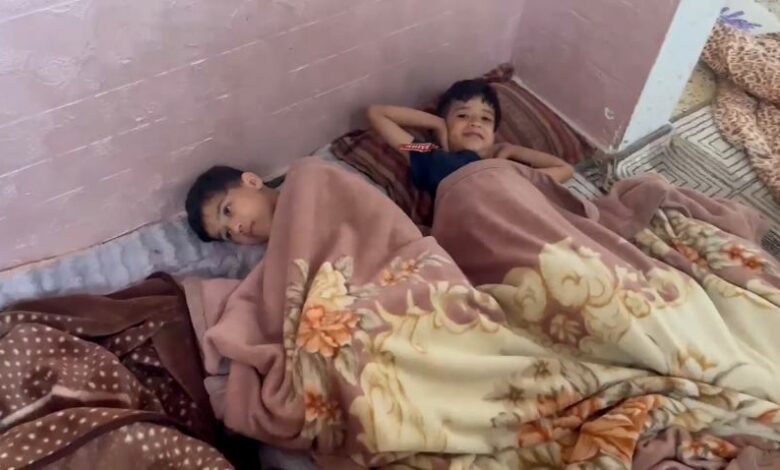
Fresh protests against Israel’s siege of Gaza are expected across much of the Middle East on Friday as aid agencies warned hospitals in the enclave are running out of fuel amid fears life-saving aid will be still stuck in Egypt for another day.
With the humanitarian crisis in Gaza deteriorating each hour, Israeli leaders have been rallying troops preparing for a potential ground incursion and on Friday morning they issued a mandatory evacuation order to some 23,000 residents living near the border with Lebanon.
In a speech from the Oval Office Thursday, US President Joe Biden reiterated his government’s commitment to Israel’s war against Hamas, casting it as vital to America’s national security and likening it to Ukraine’s fight against Russia’s invasion.
But he also cautioned the Israeli government not to be “blinded by rage” and said the “humanity of innocent Palestinians” cannot be ignored.
Biden’s support illustrates the deepening divide between Western allies and Arab countries, where fresh protests were expected on Friday in support of 2.2 million Palestinians who remain trapped in Gaza, heightening fears of a wider regional conflict.
Around 200 trucks carrying vital aid are queuing outside the closed border as officials work towards an agreement to open the gates. Negotiations continued through Thursday as workers filled dangerous road craters from Israeli bombing to allow up to 20 trucks to pass in an initial delivery.
Video released Friday by the Sinai Foundation for Human Rights showed “repair work and paving the road between the Egyptian and Palestinian sides” at the Rafah crossing. Egyptian authorities have begun to remove cement blocks at the entrance to the crossing in preparation for its opening, several drivers at the crossing told CNN.
But the possible initial passage of 20 trucks would be far lower than usual. “We need to build up to the 100 trucks a day that used to be the case of the aid program going into Gaza,” United Nations relief chief Martin Griffiths said in an interview with CNN’s Christiane Amanpour.
“We need to be able to have the assurance that we can go in at scale everyday – deliberately, repetitively and reliably,” Griffiths said.

But while Biden and Egyptian officials indicated aid would flow as planned on Friday, multiple sources told CNN it could be delayed. A US official cautioned that the situation remained fluid.
UN Secretary-General António Guterres arrived in northern Sinai Friday, at a time he described as “a moment of profound crisis…unlike any the region has seen in decades.” Guterres traveled to the Middle East as part of the UN’s effort to get humanitarian aid across the Egyptian border into Gaza.
“For nearly two weeks the people of Gaza have gone without any shipments of fuel, food, water, medicine, and other essentials. Disease is spreading. Supplies are dwindling. People are dying,” Guterres said in a statement Thursday.
Life inside Gaza is becoming even more challenging for hundreds of thousands of Gazans as Israel’s siege of the enclave has lasted nearly two weeks.
A group of UN independent experts accused Israel of committing “crimes against humanity” in its current campaign.
“The complete siege of Gaza coupled with unfeasible evacuation orders and forcible population transfers, is a violation of international humanitarian and criminal law. It is also unspeakably cruel,” the UN Human Rights Office said Thursday in a press release.
Doctors Without Borders, also known as Médecins Sans Frontières (MSF), said Thursday Gaza’s main medical facility, the Al-Shifa Hospital, only has enough fuel to last 24 hours.
“Without electricity many patients will die,” said Guillemette Thomas, the group’s medical coordinator for Palestine, based in Jerusalem. Thousands of Palestinians are using Al-Shifa hospital as a safe haven from constant bombing, he added.
Many supermarkets have no more food to sell, and everyday tasks have become grueling for residents who queue for hours for food and water under the roar of airstrikes.
The population of southern Gaza has swelled in recent days after the Israeli military told around 1 million residents to leave northern Gaza ahead of the expected Israeli ground incursion.
Gaza’s oldest church, St. Porphyrius Greek Orthodox Church in central Gaza City, said its compound was hit by an Israeli airstrike on Thursday night.
The Hamas-controlled Ministry of Interior and National Security said in a statement that an Israeli airstrike hit one of the buildings belonging to the Orthodox Patriarchate of Jerusalem causing it to collapse, injuring many people.
The Israel Defense Forces (IDF) on Friday acknowledged that “a wall of a church in the area was damaged” as a result of a strike that targeted a “command and control center belonging to a Hamas terrorist.”
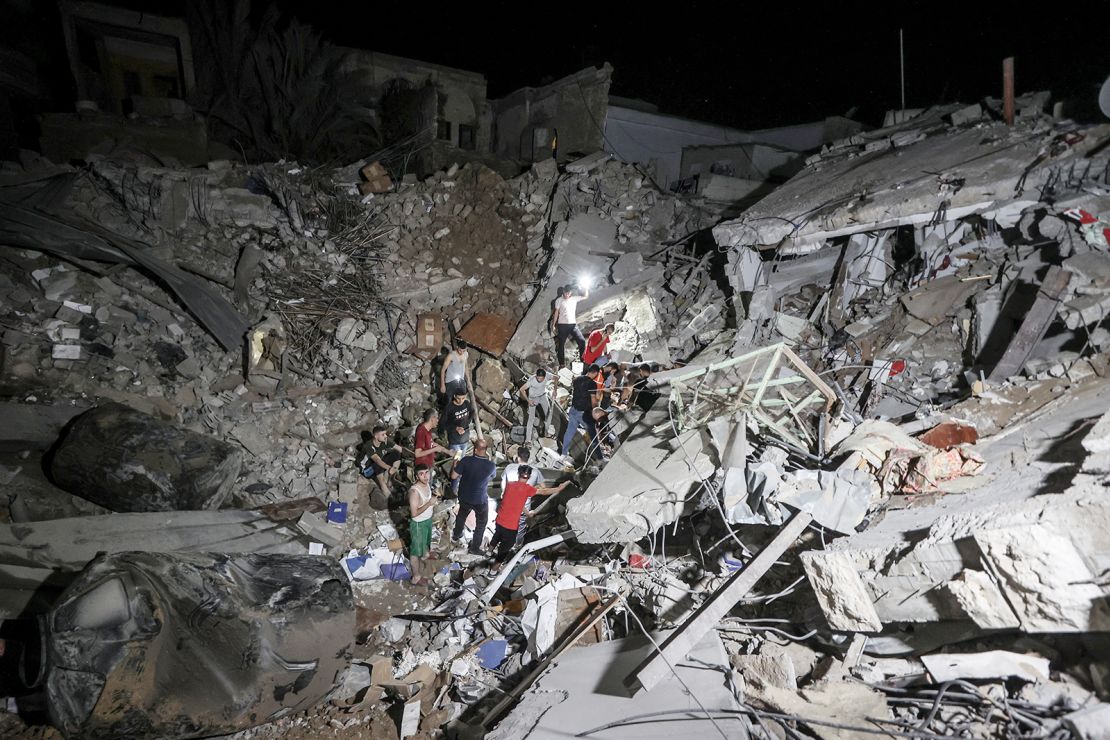
Soon see Gaza ‘from the inside’
Israel’s sustained assault on Gaza follows Hamas’ murderous rampage on October 7 that killed an estimated 1,400 people in Israel, mostly civilians, in what has been described as the worst massacre of Jews since the Holocaust.
In the days since, Israeli airstrikes have killed more than 3,700 people in Gaza, according to the Health Ministry in Gaza, which is controlled by Hamas. Among the dead are hundreds of women and children.
Speculation over a possible ground incursion heightened after Israel arrested more than 60 suspected Hamas operatives early Thursday in the West Bank.
Among those detained during raids was Hamas spokesperson Hassan Yousef, Israeli authorities confirmed Friday.
Yousef is a leading Palestinian political figure serving as the official Hamas spokesperson in the West Bank and holding a seat on the Palestinian Legislative Council.
Meanwhile Israeli Defense Minister Yoav Gallant told troops gathered not far from the Gaza Strip on Thursday that they will “soon see” the enclave “from the inside.”
Separately, Israeli Prime Minister Benjamin Netanyahu told other troops in another area bordering the Gaza Strip that the entire nation stands behind them. “We will give the hard blow to our enemies so that we can achieve victory. For Victory! Ready?!” he said.
Early Friday morning, CNN’s Nic Robertson witnessed increased military activity along Israel’s border with Gaza.
Several illumination flares were seen floating down in the distance while red tracer rounds were accompanied by the sound of heavy machine gun fire.
CNN is unable to say what the night-time military activity was.
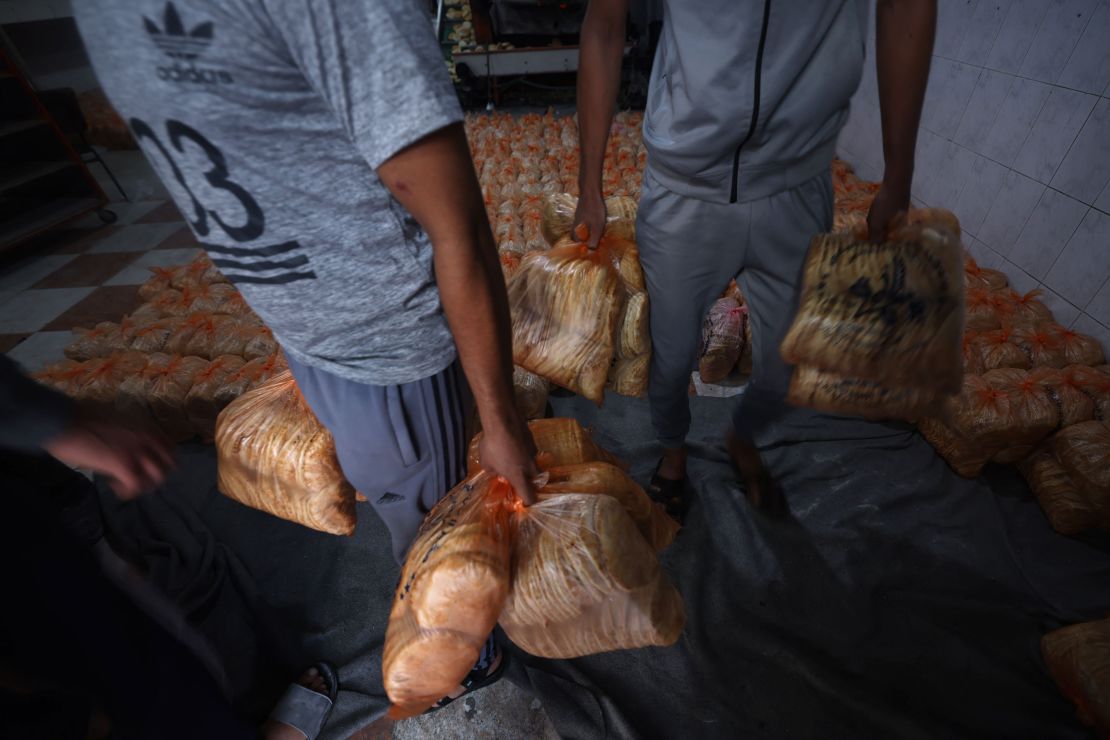
Protests in the Middle East
Israeli warplanes’ relentless bombardment has left hundreds of thousands of people homeless and sparked growing protests across the Middle East.
Egypt’s state-aligned political parties and institutions have called for nationwide protests in Egypt on Friday in support of Palestinians, a rare moment during a decade of strict anti-protest laws.
European Commission President Ursula von der Leyen said Thursday that the risk of regional spillover from the Israel-Hamas war is “real.”
“We have seen the Arab streets fill with rage, all across the region … This is exactly what Hamas was hoping to achieve. And this can derail the recent and historic rapprochement between Israel and its Arab neighbours,” von der Leyen said during a speech at the Hudson Institute in Washington.
Anti-Israel protests gained momentum this week after hundreds of Palestinians were killed Tuesday in a blast at the Al-Ahli Baptist Hospital in Gaza.
Palestinian officials have accused Israel of hitting the hospital, a claim Israel denies. Israeli and US intelligence have each assessed that the blast was caused by another Gaza-based militant group’s misfired rocket.
Saudi Arabia, Jordan, Egypt, the United Arab Emirates and Iraq issued statements condemning Israel and accusing its military of bombing the hospital.
With anti-Israel protests rising across the Middle East there are fears other fronts could open up, particularly on Israel’s northern border with Lebanon where Hezbollah dominates and has increasingly clashed with Israel’s military over the last week.
CNN’s Mohammed Tawfeeq, Tamar Michaelis, Daniel Oz, Nic Robertson, Muhammad Darwish, Jake Tapper, Jennifer Hansler, Alex Marquardt, Sahar Akbarzai and Jo Shelley contributed reporting.

